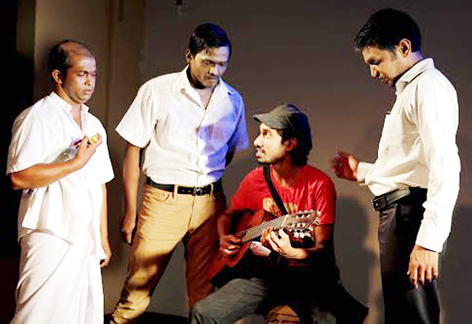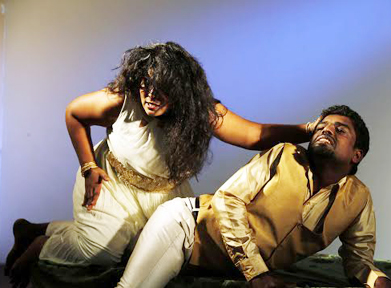|
DRAMA
Keti Naatya Gomuwa:
Statements of despair and dwelling aspirations
by Dilshan Boange
Four impactful works of theatre mounted the boards of the Punchi
Theatre in Borella on February 18, as the 'Unnamed Theatre Group'
presented their' Keti Naatya Gomuwa' (a Short Play Collection). The
short plays each had a different theme and set of central issues that
gave them the distinction of being works with separate identities and
not bound to one another but reflected significantly the common angst of
today's Sri Lankan youth over the burdens that have been bequeathed to
them through socio-cultural perceptions and socio-political
predicaments. 'Keti Naatya Gomuwa' shows how there is a vein of
restiveness in contemporary youth that questions the legacy of
generation(s) that precede them.
 These
plays are not for children owing to the use of expletives in certain
instances. These
plays are not for children owing to the use of expletives in certain
instances.
The four plays were in order of performance -'Daahak Denavako' (Give
Me a Thousand) written and directed by Jude Claudius, 'Aanduve Rassava'
(The Government Job) written by Susith Vijayamuni and directed by
Pradeep Aragama, 'Kiri Amma Avathaare' (Grandmother's Ghost) written and
directed by Samantha Paranaliyanage, and 'Dharmishta Samajayak
Godanagam'u (Let's Build a Righteous Society) written and directed by
Jude Claudius.
The first three plays were dramas with duos, while the last had an
ensemble of five personae. Casting was commendable in each play and
brought out the power of the script as dialogue that was 'lived' on
stage. While all the actors in general performed very well and deserve
robust applause, I would like to especially cite Nalin Lusena (acting in
the first and last play), Kanishka Saviour and Surani Anupama (both in
the second play) as being notably praiseworthy, while Nilanka Dahanayaka
as the prophesying madman in the last play delivered a brilliant
performance.
Equally important
The first play had a story premise and dynamic situational interplay
between a suicidal old man and his young male lodger on an unrelenting
mission to find money to pay for a taxi ride to go rescue a good friend
believed to be contemplating suicide. It presented the complexity and
frictional intensity of human emotions in a moment of personal crisis in
the context of intrapersonal prioritisations determining that all human
lives cannot be weighed out as equally important. It spoke of a 'concentricism'
as the basis of who qualifies for our generosity in this world. In
effect it spoke of a concentric humanism as the reality that shapes our
humanity. The play drives in some strong questions and among the most
overtly thematic ones are -What leads people to suicide? Can money solve
all problems? Does money decide between life and death? These are surely
questions pertinent to the youth of today.
The second play showed how the desperation for 'suitable employment'
and financial stability creates a dilemma to a young couple hoping to
get married and enter the fold of a conventional life, when the only job
the young man is able to secure up to that point is of 'Executioner' at
the Prisons Department. What do young graduates really want when they
apply for jobs? It is just a monthly salary? The play asserts these
'wants' as much more, being -financial security plus dignity through
'designation' construing something of a 'status claim' in the eyes of
society. The acting was powerful and almost spellbinding as the young
lovers intensified their dialogues. Towards the end a polemic develops
as the young woman who sees in her lover a 'killer' who urges the
abortion of their child she reveals to be carrying, since he would
rather do that than allow an 'illegitimate conception' to take its
natural course and be thrown off track from the conventionalisms of how
a 'respectable' marriage and family life should systematically develop.
The most impressionable line spoken by the young woman that struck me
was Ape asaranakama veradi karanna lisen ekak neme. (Our helplessness is
not a licence to do wrong.).
Unpalatable truths
The third play dealt with how traditionalism weighs down the
'matrimonial bed', almost to the point of divorcing a couple's
'ownership' over their marriage, and dictating what qualifies their
marriage as 'valid'. The play inquires through its story why do people
get married and to please whom? Who determines the private space of the
marriage? This play had the audience roaring with laughter as a work
that uses the comedic approach to create a social critique through
theatre. The manner by which old beliefs in the supernatural and the
afterlife are utilised as ploys to avoid revealing to each other
unpalatable truths by the honeymooners was an ingenious approach to
symbolise how traditions of antiquity that dictate the 'foundations' for
'married life' can become demons that haunt newlyweds at the very
doorstep of marital life.
 The
Book of Exodus provides to the effect the biblical assertion 'The sins
of the father shall be visited on the children.' Much of this belief is
nuanced in the last play, which speaks of how each generation that
succeeds the one that birthed it, is bequeathed the burdens of the
consequences of the predecessor's wrongdoings. A young man who earns a
living as a wayside guitarist, at an 'ungodly hour', falls victim to
violence by a trio of disgruntled men of 'paternal vintage' who lament
the state of the country and find fault with today's youth for their
restive, rebellious nature, lack of indiscipline and disrespect for
elders. The
Book of Exodus provides to the effect the biblical assertion 'The sins
of the father shall be visited on the children.' Much of this belief is
nuanced in the last play, which speaks of how each generation that
succeeds the one that birthed it, is bequeathed the burdens of the
consequences of the predecessor's wrongdoings. A young man who earns a
living as a wayside guitarist, at an 'ungodly hour', falls victim to
violence by a trio of disgruntled men of 'paternal vintage' who lament
the state of the country and find fault with today's youth for their
restive, rebellious nature, lack of indiscipline and disrespect for
elders.
Vagrant madman
The play pulsated with both direct and metaphoric schema related to
past civil insurgencies in our country. There is much symbolism in the
play through the characters. The harmful trio claim to be mourners after
attending a funeral wake en route to another. Death and decay seem to be
what they are bound to. The guitarist who is the victim of violence and
vilification at the hands of elders sees no road ahead. The vagrant
madman who foretells the arrival of the assaulters and urges the young
man to leave before it's too late is like the buried conscience of a
lost generation whose perceived 'insanity' reduces it to 'incredibility'
in the eyes of 'society'. Perhaps the 'madman' was trying to reveal a
'higher truth' that is meant to go unheeded by contemporary society.
After all he is a madman. But then one may contend, what is so fully
sane and rational about this world today?
Writer and theatre practitioner Udayasiri Wickremaratne once told me,
the best compliment that can be given a stage play is to know a viewer
wishes to watch it again. Those four plays deserve resounding applause.
I will honestly say that I'm eagerly awaiting another staging of Keti
Naatya Gomuwa. It is a statement by the youth of today to the youth of
yesterday who are the elders of today. What I encountered that evening
was a powerful theatre experience that seeks to address contemporary Sri
Lanka's collective psyche. |

